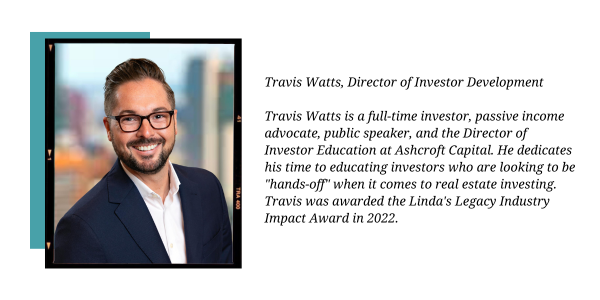January 5, 2023
By: Travis Watts, Director of Investor Development
Large multifamily properties have historically been owned by institutional investors such as mutual funds, REITs, insurance companies, and pension plans because of the stability and yield that apartments offer.
Being a Limited Partner investor allows an accredited investor and in some cases, a sophisticated investor an opportunity to buy a passive ownership stake and participate in these same large real estate acquisitions; a 400-unit apartment building, as an example. The Limited Partners (individual passive investors) can experience the same buying power, leverage, and potential tax benefits, just as institutional investors do.
The individual passive investor has the benefit of owning a percentage of an apartment community without day-to-day management obligations. Additional benefits may include monthly or quarterly cash flow distributions, potential income sheltering through depreciation and tax benefits, debt leverage, principal pay-down, and potential appreciation in value.
Predictable Income
An apartment building’s revenue is derived from rents paid by the residents for leased units and other income-generating items such as covered parking spaces, fenced-in yards, coin laundry facilities, and on-site storage facilities, to name a few. A strong property management team will focus on attracting qualified residents to the property and carefully have lease agreements executed, often with contracts lasting 12 months or longer. These practices in turn, generate long-term, consistent cash flow for the Limited Partner investors.
Forced Appreciation
By making improvements to an existing property (known as a value-add business plan), the property’s value can increase through this repositioning process. By increasing rents and occupancy, higher levels of revenue are generated. Since multifamily apartments are primarily valued based on the income they produce, a value-add business model can in a sense, “force” the property to appreciate in value rather than relying on market conditions or annual inflation. When the property is refinanced or sold, the proceeds can be returned to the Limited Partners or in some cases, can be rolled into another “like-kind” investment property using a 1031-exchange to defer the taxes.
Steady Cash Flow
One of the greatest advantages of real estate investing is the steady, and often tax-sheltered, monthly cash flow. Few investments can be bought with the same kind of steady cash flow return combined with the appreciation potential.
Tax Benefits
Distributions made to the Limited Partners are treated more favorably than most other types of investments because a significant portion of the distributions are often not considered income according to the tax code. This is due to the flow-through of expenses and depreciation. Additionally, the capital appreciation is deferred from taxation until the assets are sold and may be further deferred from taxation if a 1031-exchange is implemented.
Total Returns
An apartment’s combination of stable cash flow (primarily derived from rents), capital gains (resulting from increased property value upon sale), principal paydown (from residents paying down the loan balance over time) and tax savings (due to the current IRS rules and the additional benefits from the Tax Cuts and Jobs Act passed in 2017) provide returns that can be quite impressive given the current state of the stock market and the lack of yield offered by banks, money markets, CDs, and bonds.
A Hedge Against Inflation
Historically speaking, rents, property values, and the replacement cost of real estate improvements rise with inflation. This makes real estate a particularly effective hedge against inflation, and might be an asset class to help you balance your investment portfolio, especially in the low yield environment we are in today.
Ownership of Real Estate
Passive investors desiring steady income with a balance between risk and reward, may consider multifamily apartment investing as a Limited Partner to provide a solid foundation for building lasting wealth. Additionally, the ability to use a “hands-off” investing approach can be useful in building passive income streams that, in turn, free up time to spend on what matters most to the individual investor.
If you would like to learn more about investing in multifamily assets, visit https://info.ashcroftcapital.com/fund, or schedule a call with our Investor Relations Team at investorrelations@ashcroftcapital.com.



